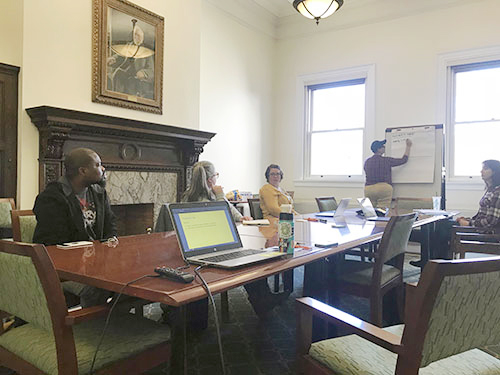Grant Spotlight | January 28, 2021
Share ThisJanuary 28, 2021
“With this grant, we turn volunteers into self-sufficient learning ambassadors in their communities.”
—Dan Hensley, Adult Programming Coordinator, Carnegie Library of Pittsburgh Office of Programs and Partnerships

When we think of learning, we often default to sitting in classroom (or these days, a virtual one). However, there are many other methods of informal learning, such as watching a DIY tutorial or informational video, or exploring a museum.
But there’s a middle ground—yet another learning framework that the Carnegie Library of Pittsburgh (CLP) and Peer-to-Peer University (P2PU) have been exploring, thanks to a 2019 National Leadership Grant for Libraries from the Institute of Museum and Library Services.
Non-formal learning doesn’t have elements like curriculum, a syllabus, accreditation, tests, or certifications that you would find with formal programs, but still has more structure than informal learning.
Through their project, CLP and P2PU have developed resources for public libraries that empower volunteers to organize and facilitate non-formal adult learning programs, which focus on sharing knowledge and building skills. Their model takes on several formats, such as group skill-shares and discussions, peer-facilitated Learning Circles, and one-on-one mentoring relationships.
Community-Powered Learning
This volunteer-led project builds on work done in 2015 through a previous IMLS grant. In that experience, P2PU collaborated with public libraries across the country to organize Learning Circles, which are groups of people who get together to take online courses. The new grant does more than just organize people: it provides a set of tools, such as facilitator trainings and guidebooks, to help libraries to recruit, train, and empower volunteers.
“This program supports libraries in gathering and identifying good resources. Then, we get out of the way and let community members meet, interact, and learn together,” said Dan Hensley, Adult Programming Coordinator at Carnegie Library of Pittsburgh Office of Programs and Partnerships. “The library doesn’t determine the subject of learning—instead, it enables people to meet their own learning goals.”
To kick off an adult learning program, the first step for community member volunteers is the facilitator training, a three or four session course that explains how adults learn and how to work with them.
The project team in Pittsburgh delivered the pilot facilitator training, along with user testing among the community volunteers, to gauge whether they felt prepared to conduct their own learning groups.
Following that feedback, the project team provided training content to volunteers at Onondaga County Public Library in New York and Multnomah County Library in Oregon to use in their communities. The program is set up to allow libraries to increase their program capacity while working within current staff levels to meet community learning needs.
P2PU also developed a web portal to organize learning opportunities in the community, as well as offer information about the program and how to get involved. The program, like many others, has had to go online due to the COVID-19 pandemic, but since the resources are available online, libraries and “learning ambassadors” can leverage materials from anywhere.
Peer-Led Learning at Its Best
In 2016, CLP began implementing Learning Circles from the previous IMLS grant. Although they were an effective way to facilitate group learning by keeping participants together and actively engaged, Hensley noticed that something was lacking.
“We were replicating our existing programming because staff members were picking the topics,” he explained. “I saw potential for this to be more open-ended, because people want to learn all kinds of things.”
The new program was an opportunity for the library to go beyond the usual computer skills classes. With the funding from their 2019 grant, the volunteer-led learning program supports libraries in running successful courses on everything from social justice to watercolor painting to coding.
Despite the program being able to pivot to Zoom gatherings, Hensley said that the digital divide presents equity challenges for participants who don’t have access to the technology they need to take courses at home.
“We’re really looking forward to training more facilitators so we can hit the ground running when we can safely allow people back in our spaces again,” Hensley said. “The social element is very important to the program.”
For now, the project team is excited about the positive outcomes they have already experienced, such as libraries attracting more volunteers and potentially adopting this program style after the grant period ends in June 2021.
“I have high hopes for the future… I think these resources will end up getting a lot of use,” Hensley said.
About the Project
Grant Project Name: The Library as a Hub for Volunteer-Led Adult Learning Programming
Grant Log Number: LG-13-19-0029-19
Year Awarded: 2019
Recipient: Carnegie Library of Pittsburgh
Project Contact:
Dan Hensley
Adult Programming Coordinator
Carnegie Library of Pittsburgh Office of Programs and Partnerships
412-924-0062
hensleyd@carnegielibrary.org
Website: www.carnegielibrary.org
